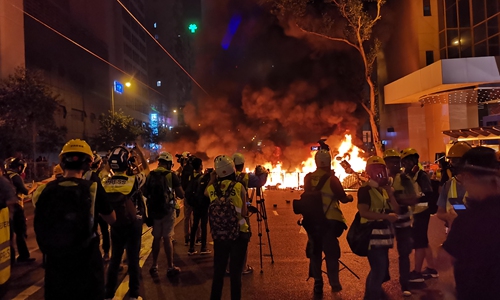National security law to solve long-term woes in HK
Source:Global Times Published: 2020/5/23 19:43:49 Last Updated: 2020/5/23 23:12:08

Hong Kong protesters set fires, which caused small explosions and heavy smoke, in Wan Chai on August 31, 2019. Photo: Yang Sheng/GT
The central government's push to introduce new national security laws in Hong Kong shows its strong determination to solve the long-term woes in the special administrative region. The legislation shows that the central government has shouldered the responsibility to maintain Hong Kong's order and safeguard China's national security after the months-long violent protests almost put the city at the edge of a cliff.
Once such a piece of legislation is on its way, the central government will face challenges not only from within Hong Kong and Taiwan, but also external forces. The education system in Hong Kong may also need adjustment. These are the problems the central government needs to tackle with its overall sovereignty over Hong Kong.
The US has already acted restlessly. Its president has threatened strong reactions. US Secretary of State Mike Pompeo has warned China of its decision to pass a new national security law, which he called "a death knell." Senators uttered they would introduce legislation to impose sanctions on Chinese officials for violating Hong Kong's independence. The US may also impose pressure on China by levering trade issues.
Hong Kong has always been a site of competition between China and the US. Since the founding of the People's Republic of China, the US has played an active role in cultivating anti-communism forces in Hong Kong. After Hong Kong's return to the motherland, due to the absence of a national security law, the US' influence has penetrated into the education and media spheres in Hong Kong. As last year's violent and massive protests in Hong Kong came into the international spotlight, the US has begun to use deep-rooted anti-communism and anti-China forces in Hong Kong to heighten its comprehensive competition with China.
It is not surprising that the US is singing the same old tone when it comes to the proposed national security law, saying the law undermines the "one country, two systems" principle. But it tends to ignore the fact that the "two systems" only function under the framework of "one country," the premise of which is national security. That the central government proposes relevant laws to ensure the stability of Hong Kong and the whole country is a guarantee that the "one country, two systems" principle will remain as it is.
Hong Kong's opposition and the US deem the "one country, two systems" principle as the bedrock of Hong Kong's "absolute" autonomy. They say the principle is being undermined, but the central government is merely exercising its legitimate rights over Hong Kong and ensuring that Hong Kong enjoys a high degree of autonomy. It is anticipated that opposition will exploit this chance to stage large-scale protests and even violent riots to secure a victory during the legislative election scheduled for September. The central government will have had a detailed assessment of the situation and prepared corresponding measures.
The article was compiled by Global Times reporter Wang Wenwen based on an interview with Ling Yu-shih, a Hong Kong member of the 13th National Committee of the Chinese People's Political Consultative Conference. wangwenwen@globaltimes.com.cn
Posted in: VIEWPOINT,FOCUS右